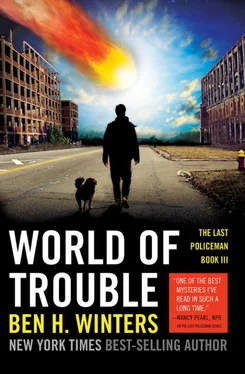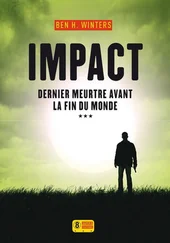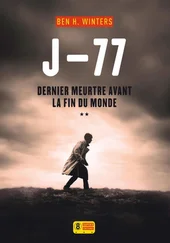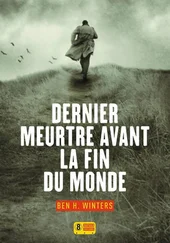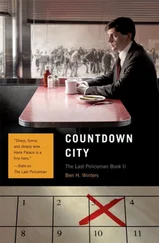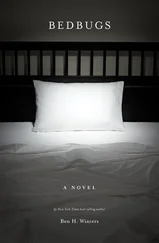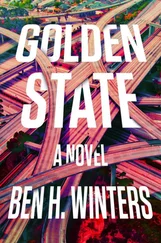“And that’s what happened?”
“Yes. I went and searched that barn as I had intended, and returned at the appointed time.”
“At half past five.”
“Yes.”
“And they were all gone and the concrete floor piece was waiting?”
“Yes. Along with the food I had been promised. What you called them.”
“MREs,” I say absently, and chew for a moment on my lip.
“You didn’t pour the concrete?”
“No,” he says. “It was built when I got there.”
I don’t write any of this down, I have run out of paper, but I think I will remember. The timelines, the details. I’ll remember. “And so by five thirty all of them were gone?”
“Yes.”
“They had gone under?”
“Well. I don’t know. But they were gone.”
And that’s it, end of story, end of the day of September 26. Atlee and I stand together in thoughtful silence, leaning on a fence in the darkness at the far edge of Joy Farms.
After a last moment of standing side by side, Atlee turns away from the fence and wordlessly hands me the one thing that was missing from my pockets, my department-issue pistol. He has no more information to give me, but there is one thing I still need. I describe my request and he readily accedes—tells me where I have to go and whom to talk to. He takes my notebook and writes on the back of it. I bend my head gratefully. I feel genuine sadness for this old man, the mantle he has laid on himself, the Herculean task of making believe that the world is still more or less what it has been. He has acted like a Secret Service agent leaping in slow motion, hurling himself in the path of the information.
As I step at last off the fence and begin to say goodbye, Atlee Miller cuts me off, holds up his pitchfork at shoulder level.
“You said, I think, that this girl is your sister.”
“Yes.”
He looks me over again, seeming to decide something. “The man, Astronaut. Mild, as I said. Polite. But on his belt, a workingman’s belt, he wore a long-barrel pistol, and a sawtooth buck knife, and a claw hammer.”
Atlee’s expression is set and somber. A chill drifts down over me like snow.
“He never took off the belt, never used it. But there it was. This is what I noticed about him, this man, the leader of this group,” he says. “A quiet man, but with one hand always on this belt.”
* * *
I see Houdini on my way out, still in that muddy spot he picked out behind the shed. Wallowing, practically inert, head tilted, asleep. A couple of the Amish kids are nearby, playing jacks on a patch of hard dirt. Houdini will like that, when he wakes up, he’ll like to hear them laughing. It happens the same way Atlee described it, in the crack of a moment—I don’t call to the dog. I don’t even get close enough to wake him. I move quietly past with my head down, looking back once and then moving on.
It isn’t easy, because he’s a good dog and he has been good to me and I love him, but I leave him behind in this big green place that smells like animals and grass, among these people who will take care of him into a good old age, at least as far as either party knows.
* * *
“Wait, please.”
A girl’s voice, just loud enough to be heard. I stop and turn around and there’s Ruthie, the one I caught cheating on the blessing, with the big blue eyes and the plaited strawberry blonde hair. One of the oldest of the giggling Amish girls, but she’s not giggling now. Grave-faced, cheeks flushed from running, her plain black dress dusty at the hem. She has caught me at the crook in the path, where the farm turns into the road. Staring at me, intent, her anxious fingers reaching for my sleeve.
“Please. I have to ask you.” She glances once nervously back at the house. I almost say “Ask me what?” but it would just be buying time. I know exactly what she means as soon as she says it.
The radio, up there in the barn. An innocent child alone in the moontime darkness of the loft, listening to forbidden music and enjoying a rare breath of independence, a respite from chores and sibling responsibilities, when she hears the baffling news, and at first she is confused, and then it slowly sinks in, what it means, what all of it means.
Pretending since then. Putting it on. Poor young Ruthie knows about Maia, just like her grandfather she knows, but she has not told him. Not wanting him to know that she knows, not wanting him to know that she knows that he knows. Hide-and-seek at the end of the world.
But here she is. Standing and waiting for me. Her fingers clutching at me. “How much longer?”
“Ruth,” I say. “I’m sorry.”
She tightens her grip on my sleeve. “How much longer ?”
I could give her a reprieve: there’s a plan in motion, actually. Department of Defense Space Command, they figured something out. A standoff burst, a nuclear detonation at one object radius from the asteroid, releasing sufficient high-energy X-rays to vaporize some portion of its surface… everything is going to be fine .
But I can’t do that, so I just say it as quickly as I can, tearing off the Band-Aid, “Three days,” and she breathes sharply and nods bravely but stumbles forward into my arms. I catch her and hold her small body to my chest and kiss her gently on the top of the head.
The voice of Cortez, singsong in my ear. Everything reminds you of your sister .
“I’m so sorry,” I tell her. “I’m really, really sorry.”
It’s just words, though. Just a bunch of tiny little words.
PART FOUR
Go On and Get to Work

Everything is exactly as it was.
The headquarters of the Rotary Police Department is like a small gray ship docked in the gloom. The driveway a rough horseshoe of gravel. Two flagpoles, two beleaguered flags. I approach in sunrise silence, work shoes crunching on the gravel, like a mountain man returned to civilization after a long wilderness exile, only civilization is gone. It’s just the one dull municipal building, planted like a ruin in the center of an overgrown lawn. It’s raining again. It rained on and off all night.
I slept again for five hours in the middle of the night on the side of the road, at my same YOU ARE HERE rest stop, my coat jacket folded neatly for a pillow, my police-department pistol in the crook of my arm.
Now it’s morning and as I step off the road onto the grass I can sense them, feel them—I can practically hear them down there under my feet, nosing around in their underground lair, the basement warren they dug down into and took over, the maze they’ve occupied. My mind has built mythologies around them all, cloaked their names in malevolent auras. Tick, long-faced and bizarre. The very thin black girl, moody and cruel. Astronaut with his bushy black hair and his belt of weapons. All of them are listed now in black pen in my blue notebook. Suspects. Witnesses, though to what I am not yet sure. They’re all down there, scuttling around like spiders, and they’ve got my sister.
It’s Monday now. Monday morning; 9:17, according to the Casio. Two days to go. I’m almost to the door of the station when there’s a sudden sharp scrape from just above me. The roof. I jump back from the door, draw the gun, and shout “Police!”
Old habit. Can’t help it. My heart beats. Silence—ten seconds—twenty—me stepping slowly backward, one big step at a time, trying to get to a place where I can see what’s up there.
Then the noise again, a scrape and then a rustle, and then new silence.
I try again, louder. “If there is someone up there, show yourself immediately.” What do I say then? I’ve got a gun . Everybody’s got a stupid gun.
Читать дальше
